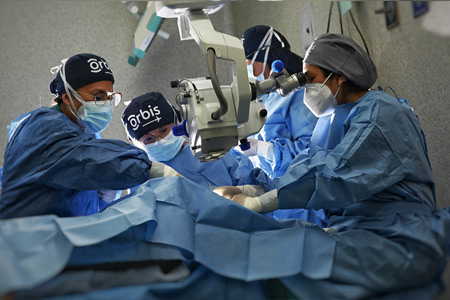Orbis International began a five-day on-site hospital training to enhance the skills of local eye care professionals in treating glaucoma. Despite it being the second-leading cause of blindness in Peru, there is a lack of necessary knowledge for treating the disease.
Held at the Regional Institute of Ophthalmology (IRO), the leading specialized eye hospital in the rural La Libertad region of northern Peru, the training will improve the surgical techniques of ophthalmologists – who are often the only specialists available for glaucoma care in the region – and train nurses to support these critical surgeries.
The training is made possible through generous funding from Dr. John E. Downing, an Orbis Volunteer Faculty member and donor, and equipment provided by Alcon.
"Dedicated, on-site trainings can make a huge difference in a rural area," says Dr. Doris Macharia, Senior Vice President of Global Programs at Orbis International. "When a hospital is the only option for specialized care, it's critical that its physicians and staff are equipped to handle both common and complex cases. We are grateful for the support that makes this training possible. It will build sight-saving skills that will ultimately transform lives."
Two ophthalmologists will receive hands-on training from Orbis Volunteer Faculty member Dr. Gabriel Lazcano Gomez, a glaucoma expert from Mexico. Four ophthalmic nurses will receive practical training from Orbis staff nurses. During the training, 32 patients with complex glaucoma will undergo surgery. Given that glaucoma primarily affects older individuals, any patients found to have age-related cataracts will receive treatment for this common cause of vision loss as well.
Participants will also learn best practices for educating patients on eye health and preventive care, which is especially important in glaucoma cases because blindness from the condition can be avoided, but only with access to early treatment.
On-site hospital training allows eye care professionals to learn new skills in their own work environment and with their own equipment, promoting confidence and sustainable improvements in patient care.
In Peru, eye care specialists are concentrated in urban areas, leaving rural communities underserved. The training at IRO aims to address this by enhancing the care provided, especially for challenging cases. It will also help IRO serve as a technical adviser for other ophthalmology service providers and community health facilities in northern Peru.
For more than four decades, Orbis has improved eye care access in Peru through training, fellowships, Flying Eye Hospital visits, and equipment donations. While Orbis is active in improving eye care in four regions, another 22 still need basic equipment and training.
For more information please visit www.orbis.org.


